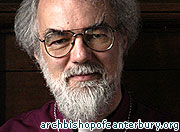Local bureaucrats who have no sense of Britain’s religious history are squeezing faith out of public life, the Archbishop of Canterbury has warned.
He says those who think religion is “automatically a problem in our public life” often lack an understanding of Britain’s Judeo-Christian heritage.
Speaking in the House of Lords, Dr Rowan Williams said a generation of administrators and local officials has grown up with “little or no sense” of “how our political and legal history” is shaped by its relationship with Judaism and Christianity.
Reluctance
He said that “failure of understanding” is one of the reasons for “the reluctance in recent years to develop effective partnership between statutory bodies and faith groups in the work of social regeneration”.
He did however say that there were signs of improvement in the area.
The Archbishop has previously accused the Government of treating religious faith as a “problem” and an “eccentricity” practiced by “oddities, foreigners and minorities”.
But in July last year Government minister Eric Pickles said everyone loses out if Christians are barred from getting involved in the community.
Banned
In March 2010 a church poster was banned from a public library in Sunderland because town hall officials claimed it could ‘offend’ other faiths. Local Muslims and Sikhs blasted the move and the decision was reversed.
In 2009 Camden Council in North London told a Roman Catholic church group that it could not advertise an event on religion and climate change unless it removed words like ‘Christian’ and ‘God’ from the text.
And in Brighton in 2009 a Sunday school teacher was told she couldn’t put up a poster at her local library to advertise a church children’s event because it ‘promoted religion’.
In 2007 a Christian care home had £13,000 of public funding withdrawn after staff refused to question the elderly residents about their sexual orientation every three months. Brighton Council later backed down and promised to restore the funding.

